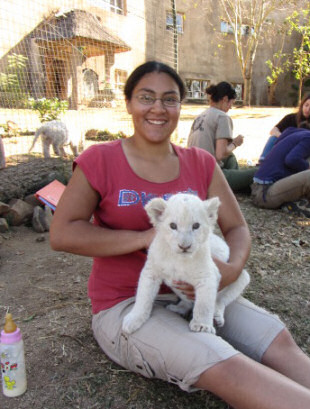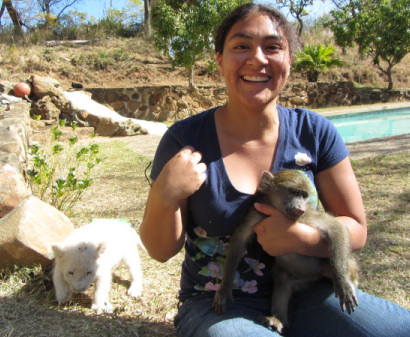Meet Frances!

Frances is an Animal Science student at Cornell University and is very interested in studying wild animals. She first became interested in animals through working with dogs and at a wildlife rehabilitation center. Domestic animals are a great way to learn about general anatomy, physiology, and management practices that are useful when studying and working with wild animals. This past summer she volunteered at a wildlife rehabilitation center called Care for Wild in Nelspruit, South Africa.
How did you hear about this internship?
I heard about this volunteer opportunity through an ambassadorwho came to speak at one of Cornell's Pre-vet Society club meetings one day. Afterwards, I filled out the online application and mailed a request to go to South Africa for Care for Wild that June. Shortly after that I received my fundraisingnd placement packet with all the details of my trip and my spot was officially saved for the summer of 2012.
What do you do on a typical day?
The first week I was at the farm I was assigned to the Cat team with 4 other people. I loved this team because I got to take care of the big cats at the center. At first, my daily morning routine began at 6 am, but after the first week I began taking care of a lion cub, named George. George and the other 5 cubs came from a white lion rescue and were brought to this center for hand-rearing because they were rejected by their mother. This meant that I needed to get up around 5 am and stimulate the cub to urinate and defecate and then bottle feed him milk formula at 5:30 am. After the morning feeding all 6 cubs were allowed to have some time to stretch out their legs until around 6 am. Then we would weigh out meat for the young lioness, two adult caracals, and two adult servals. We would also cut up meat for the spotted eagle owls, barn owls, wood owls, and prep chicken toes and a scrambled egg for the crow, Mr. Crow. We would always have a brief meeting to talk about the animals on the farm and voice any concerns or comments, then we'd go off to feed the cats and owls for that day.
After feeding all the big cats and owls, we would need to feed the baby lions again and then we would have breakfast. Depending on the day we would maybe have a lecture or presentation to help us learn more about other animals or about hand-rearing wild animals in general. Then we would go off to clean the enclosures of any scrap meat or waste and change the animals' bedding. After all the cleaning was done it was time to feed the cubs again. And this is all before lunch! After lunch, the majority of my afternoon was spent cutting up pounds of meat for the afternoon and the next morning's feeding. As gross as it sounds I really loved it, especially because I knew how much the cats would enjoy it. After all the meat was cut up it would be time to feed the animals and feed the cubs again! After the afternoon feedings the Cat team would be done for the day except for feeding the cute and cuddly cubs that still needed to be fed later on that evening.

Has this experience helped you move closer to your dream job? What's next?
This was an incredible experience that allowed me to realaize how much I love working outdoors and working with wild animals. I really enjoyed learning about each animal's behavior and sensitivities. I now know what goes into managing a center such as Care for Wild and met some incredible people that are so dedicated to their work. After this experience I know that I definitely want go back to Africa and visit different countries around the world like Australia and some places in South and Central America to work with more wild animal species. I love being able to work with and study wild animals!
